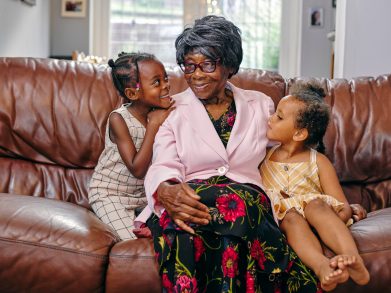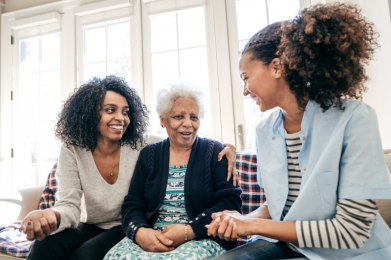Programs
You Care For Others, Let Us Care For You
Caregiving can be a fulfilling journey, but it can also be challenging – resulting in significant mental, physical, and financial strain on the caregiver. Many caregivers also report feeling isolated and alone in their role.
It doesn’t have to be that way – we can help.
Programs
You Care For Others, Let Us Care For You
Caregiving can be a fulfilling journey, but it can also be challenging – resulting in significant mental, physical, and financial strain on the caregiver. Many caregivers also report feeling isolated and alone in their role.
It doesn’t have to be that way – we can help.
53 million Americans currently serve as family caregivers to someone who is aging, ill, or disabled. In the words of Former First Lady Rosalynn Carter, “There are only four kinds of people in the world– those who have been caregivers, those who are currently caregivers, those who will be caregivers, and those who will need caregivers.”
Even though caregiving will affect all of us at some point in our lives, many caregivers do not self-identify. Too often we hear caregivers describe themselves as “just” a daughter, husband, friend, or neighbor. But if you provide support such as errands and grocery shopping, wound care and prescription management, or cooking, cleaning, and personal care at home – you are a caregiver, and you deserve support.
The following RCI programs are designed to promote your health, strength, and resilience, and can help you be better prepared for when caregiving gets tough.

Dementia
When an individual is diagnosed with Alzheimer’s or another type of dementia, their entire support system faces the implications of that complex diagnosis. The Rosalynn Carter Institute for Caregivers has developed programs specifically tailored to support dementia caregivers and help them care for their loved one – and care for themselves.
Military
The strength of our military is legendary, but at the heart of our military is a strong structure of support. RCI supports the unsung heroes behind our heroes with two military-centered support programs, which offer peer support and one-on-one coaching.

Get Help Now

Crisis TEXT Line
If you are a caregiver in need of support, you can text TOUGH to 741741 for free, 24/7 crisis counseling.

Manage Your Stress
RCI has partnered with Sharecare to offer a mini course through their mental wellbeing app, Unwinding with Sharecare, which is available to all caregivers.
RCI has developed a portfolio of data-driven programs to support caregivers in your community. We have the tools you need to become a caregiver coach or trainer or to provide greater support if you are already a coach.
Deliver RCI’s Dementia Programs
RCI designed two dementia programs that can be delivered by individuals and organizations, Dealing with Dementia (DWD) and RCI Reach. Learn how each of these tools can be used to help caregivers understand dementia and how to help caregivers manage stress, increase problem-solving, and access the information and resources they need to deal with challenges.
Offer Caregiver Education in Your Community
RCI’s program, Caring for You, Caring for Me (CFYCFM), helps caregivers take better care of themselves, collaborate effectively with professional caregivers, and be the best advocate possible for their loved one.

Support Your Caregiver Employees
One in five full-time employees is also providing care for someone who is aging, ill, or disabled, outside of their paid job. This places a significant burden on employees. Luckily, employers like you are part of the solution.
The Georgia Care-Net Coalition
Care-Nets are regional coalitions throughout the state of Georgia that bring together family caregivers and the agencies who serve them. These Care-Nets are comprised of community leaders, family and professional caregivers, and professionals in the areas of healthcare, mental health, education, ministry, business, and government.

Other RCI Resources
Strategic Initiatives
Through a portfolio of research projects and strategic initiatives, RCI is working to answer key questions about caregiver demographics, health, needs, and existing supports.
WORKING WHILE CARING
One in five full time employees is also providing care for someone who is aging, ill, disabled, outside of thier paid job
Need more information or have a question about one of our programs?
We can’t do this work without the support of caregiver champions like you.